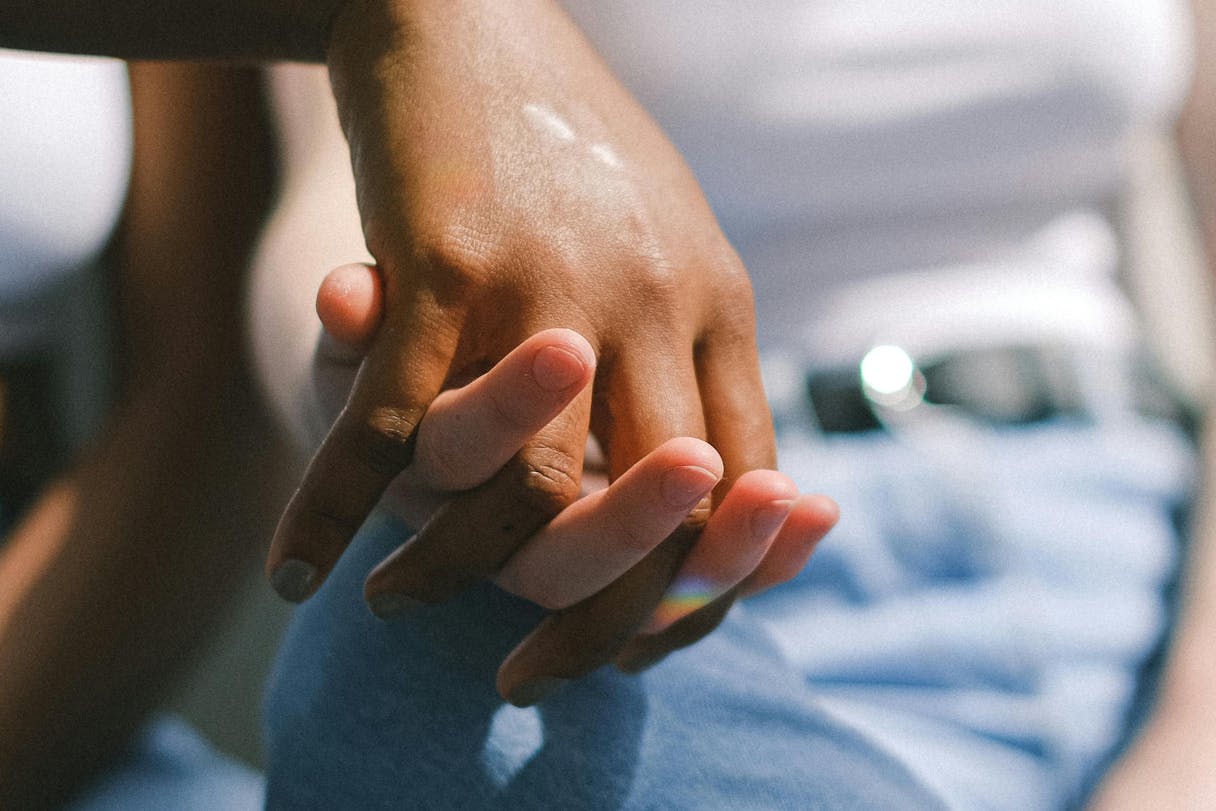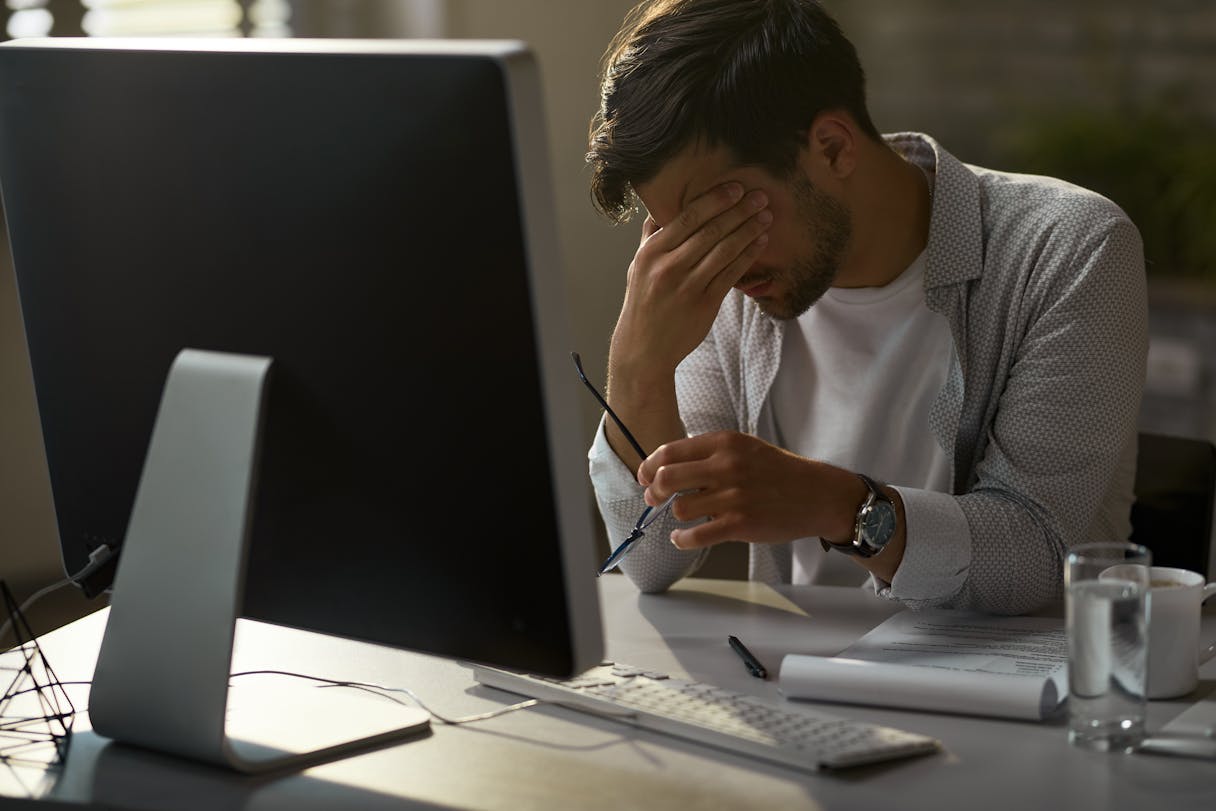Can Anxiety Cause Chest Pain?

It's the middle of an ordinary day, no different from any other, but you suddenly feel a sharp pain in your chest. Every breath is a struggle, and that sets your heart racing even faster. Could it be a heart attack? Or is it something else?
If you've ever experienced that tightness in your chest, you know just how scary it can be. While chest pain may indicate numerous medical concerns, its connection to anxiety and anxiety-related disorders can be alarming.
In this guide, we’ll outline some causes of anxiety chest pain, how to distinguish it from more severe conditions, what to do when you experience it, and what you can do to find relief and prevent anxiety chest pain from happening.*
What causes anxiety-induced chest pain?
When our body senses a threat, real or perceived, a cascade of responses occur, from the release of stress hormones to an increased heart rate. These bodily changes are designed to help you react quickly in the face of danger.
But what happens when these responses cross over from protective to problematic? Anxiety-related chest pain can manifest in various ways:
- Some may experience it as a dull ache
- Others may feel a sharp, piercing sensation
- The pain can be localized or spread across the chest
This pain is often triggered by muscles tensing in response to stress.
In addition to muscle tension, anxiety can also trigger changes in your breathing patterns. Shallow, rapid breathing, commonly known as hyperventilation, can make chest pain worse by disrupting the balance of oxygen and carbon dioxide in your bloodstream. This, in turn, can lead to tingling sensations or numbness in the hands.
What does anxiety chest pain feel like?
Anxiety-induced chest pain can vary from person to person. For some, it may feel like a dull ache or pressure, while for others, it could be a sharp, stabbing sensation. It's often accompanied by feelings of tightness or constriction in the chest, which can be pretty distressing.
It may prompt you to suspect the worst, which only perpetuates the anxiety cycle. In the midst of this distressing experience, it’s important to remember that anxiety-induced chest pain, as opposed to other conditions, is generally harmless.
Anxiety chest pain vs. heart attack
On the surface, it looks like a fine line. Anxiety chest pain and heart attack symptoms can overlap, sharing features like shortness of breath and dizziness. However, there are some distinctions:
- Location and duration: Anxiety chest pain tends to be more fleeting and can change location, whereas heart attack pain typically remains more localized and can last for longer periods.
- Character of pain: Sharp, stabbing sensations are more commonly seen with anxiety chest pain, while heart attack pain is often described as pressure or tightness.
- Associated symptoms: Anxiety-related pain can be linked to a known trigger and may occur alongside other symptoms of anxiety, such as panic attacks. Heart attack pain is less likely to be tied to a specific stressor and often presents with a more extensive mix of symptoms.
The bottom line: Anxiety chest pain is usually short-lived, tends to come and go in response to stressors or triggers, and often resolves once the underlying stress or anxiety diminishes.

Seek emergency care
Without an evaluation from a medical doctor, it’s impossible to determine if anxiety is the cause of your chest pain. Symptoms like chest pain or tightness could signal a life-threatening condition like a heart attack.
Whether you’re being treated for anxiety disorder or not, you should go to the emergency room if you’re experiencing symptoms consistent with those of a heart attack.
Heart attack symptoms
Recognizing the symptoms is crucial for prompt intervention and potentially life-saving action.
- Chest pain or discomfort: Often described as pressure, tightness, squeezing, or aching in the chest area.
- Pain or discomfort in other upper body areas: This may include the arms, back, neck, jaw, or stomach.
- Shortness of breath: You could have difficulty breathing or feel like you can't get enough air.
- Nausea or vomiting: Some individuals may experience stomach discomfort or vomiting.
- Light-headedness or dizziness: You may feel faint or dizzy, which may be accompanied by clamminess or sweating.
- Cold sweat: Sudden, unexplained sweating, especially if it's accompanied by other symptoms, can be experienced.
- Fatigue: You may feel unusual tiredness or weakness, often sudden and overwhelming.
- Palpitations: Irregular or rapid heartbeat, fluttering, or pounding in the chest may be experienced.
- Loss of consciousness: Fainting or passing out, particularly if it occurs suddenly and without warning, is a sign.
If you’re unsure of the cause of your chest pain, don’t risk it: go to an emergency room immediately. A physician can conduct tests to identify different causes of chest pain.
What to do if anxiety is the cause of chest pain
If cardiac concerns are ruled out, and you’re still experiencing anxiety chest pain, these immediate or proactive strategies might help relieve chest tightness from anxiety when it occurs.
Take stock of the situation
If the feeling is related to anxiety, remind yourself that you are likely not in immediate danger and that what you're experiencing, while real, should pass.
Focus on your breathing
Deep, slow breathing can help regulate the body's stress response. It counters hyperventilation, which often causes the tingling and numbing sensations that can accompany anxiety-related chest pain.
Free mental health resource: Deep breathing exercises
Use the 3-3-3 rule
Name three things you see, hear, and touch. This grounding technique can bring you back to the present, away from the spiral of anxiety that intensifies the pain.
Try talk therapy
In the long run, talk therapies like cognitive behavioral therapy (CBT) or psychotherapy can help you identify and manage underlying anxiety triggers, reducing the frequency and intensity of anxiety-related chest pain incidents.
Free mental health resource: Trigger Log worksheet
Consider medication as an option
For persistent or severe cases, medication is an option. Antidepressants and anti-anxiety medications can help regulate brain chemistry and alleviate distressing physical symptoms.
When it comes to chest pain, it's essential to recognize when it’s rooted in anxiety and to act accordingly — seek proper help, take healthy measures to relieve the immediate panic, and develop coping strategies for the future.

How to prevent anxiety chest pain
While it's not always possible to stop anxiety-induced chest pain entirely, there are steps you can take to reduce the frequency and intensity of episodes.
- Limit caffeine: Caffeine is a trigger for anxiety in many people, so you may want to drink less coffee, tea, or energy drinks if you're prone to anxiety or have a related disorder.
- Moderate alcohol and smoking: Alcohol and nicotine can actually increase your overall anxiety levels, and cutting back could lead to more manageable stress responses.
- Eat healthy: A balanced diet can help support physical and mental well-being, and certain nutrients like omega-3 fatty acids have been linked to reduced anxiety symptoms.
- Get some exercise: Regular physical activity is a natural stress reliever and mood booster.
Given that chest pain indicates you’re experiencing mid- to severe levels of anxiety, you may also want to consider working with a licensed mental health professional to develop personalized strategies for minimizing the psychological and physical symptoms of anxiety.
Understanding anxiety disorders
Just like it can be difficult to distinguish anxiety-induced chest pain from cardiac-related events, it can be challenging to determine if you’re just feeling anxious or if you have an anxiety disorder.
For that reason, chest pain associated with anxiety may not just be limited to fleeting moments of stress. Because this chest pain can be a sign of high levels of anxiety symptoms, it could be an indicator of an anxiety disorder.
Anxiety disorders form a category of mental health diagnoses that relate to excessive apprehension, worry, nervousness, and fear that can significantly impact daily functioning. They include a range of conditions, such as generalized anxiety disorder (GAD), panic disorder, and social anxiety disorder.
For individuals with anxiety disorders, chest pain may be a recurring symptom, and they may also encounter other physical symptoms, such as palpitations, dizziness, and gastrointestinal issues.
If you find that anxiety-induced chest pain is frequent or persistent, it may be time to seek professional help. A mental health professional can assess your symptoms, provide a diagnosis if necessary, and recommend treatment options to help you manage your anxiety symptoms and improve your quality of life.
Do I have anxiety?
If you’re wondering this, you can take an initial step to assess the level of your symptoms with our free 3-minute anxiety screener.
Images by rawpixel.com, DC Studio and pressfoto on Freepik.
*The information in this blog is provided as a general educational resource only, and is not to be used or relied on for any diagnostic or treatment purpose. This information should not be used as a substitute for professional diagnosis and treatment and does not create any patient-physician relationship between you and Cerebral. Please consult your health care provider before making any health care decisions or to get guidance about a specific medical condition.

Relationship Anxiety: Understand the Signs and Ways to Cope

Anxiety and Memory Loss

Experts Recommend Anxiety Screening for Those 19-65

Call 911 if you’re having a
mental health emergency
Text Home to 741-741 if you're in emotional
distress and need immediate support
Call or text 988 Suicide &
Crisis Lifeline. Chat service
is available at 988lifeline.org.